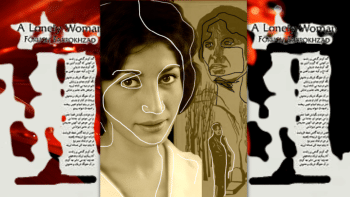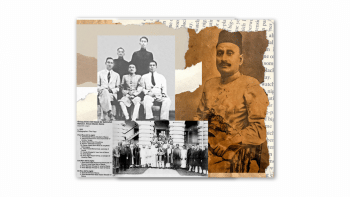Poetry review: Moon’s madness

An excerpt from the prelude of the anthology in question reads "The sun grows in us. . . . [But] We have gone miles to feed into/the moon's madness/on quiet nights, in murmurs/in bustling bazaars, in numbers/and in the midnight bloom of a night queen,/ wherever the scent of the moon grew/we packed up our senses, even the sixth,/and politely showed it the way out." Perhaps this is what Jibanananda Das too felt when he wrote: Not wealth nor fame nor creature comforts—/There is some other perilous wonder/Which frolics/In our very blood. (Translation: Clinton B. Seely).
The anthology, Bare Conversations (January 2022), is a debut collection of English poems by Protiti Rasnaha Kamal. At the onset of the 21st century, she feels the sun growing within her too but that perilous wonder which frolics in her blood, or the moon's madness, is not yet quite familiar to her, and thus she utters: Sun, will you begin again? By means of age long bond with both Muse and her subconscious feel of tradition genuinely embedded in her generic existence she reckons "nature's tides [as her] home for the soul."
We all know English writing in Bangladesh is merely in the budding, especially writing of poetry. The only name we can readily come up with is Kaiser Haq who has been writing English poetry for almost five decades. It is really welcoming that Protiti Rasnaha Kamal has stepped into the world of English poesy with her novel youthful poetic potential.
Containing a total of 53 poems, the anthology has four sections, each beginning with a page of colorful illustration and an overview of the poems of the particular section in verse fragments. It would be befitting mentioning here that, Journeyman Books, the publishing house of the anthology has done a very good job by bringing out a neat, flawless, and aesthetically worthy looking publication of Protiti's compilation.
Protiti's poems are mostly 'bare' conversational musings exploring 'selfhood, separation, exile, love and longing', as Syed Manzoorul Islam points it out in the blurb. This happens to be, in fact, the chronological essence of all the poems included in four sections of the anthology. These sections are arranged in the following order: "Keep your word", said the Universe,/and yours truly humbly began; The mystics live intoxicated in the mundane,/who keeps an eye on the stars aflame?; The path to home is paved with friends . . .; and A prayer for affection, for the soul that resists.
Whatever Syed Manzoorul Islam's blurb analysis is, a careful reader can trace the poet's self-realization in the lines like: "Enough of its past then./Its sob story goes on and on./Now it needs a new attire."; or, "I thought to myself,/if only the words/were not a tool for game!/. . . Though these are only thoughts/and thoughts rarely have/a voice." Or yet again: "You breathed life into me./Now, let me deliver."
Next is mystics, and this part themes "mystics liv[ing] intoxicated in the mundane". To the poet, mystics dwell intoxicated in the ordinary and thus vacillate between "Nonchalance" and family's molding of one's "understanding of them and their needs." She fervently feels "The rules of living are sharp/each bites off until we are bare at the core,".
Then 2 AM calls her to the door, and she wonders "at the trouble of time", and she assumes "All my days are filled with dust,/. . . I see beauty, a wonderous mess/of nature's life in its owner's dress." But since her "grounded feet are too sore to fly," and thus the inevitability is "the ones who take flight cannot nosedive into reality." Protiti realizes the reality quite well yet wishes to take flight to the moon's madness.
In the world of poesy, Protiti identifies herself as a nomad, and says, "A nomad knows the magic of the fireflies". The magic of fireflies is her ultimate goal in the path to her home, the home to which all poets hold loyalty to, and that home happens to be: Not wealth nor fame nor creature comforts—/There is some other perilous wonder/Which frolics/In our very blood. To Protiti those frolics are fireflies.
Then comes the prayer for affection for the resistant soul. Her convictive prayer tone stands out "Let me stand up now, and I'm sure I'll make it." Her wishes are "Soon, time will pass and the bend of the sky will find a/new moon at its helm . . . /You will return/and as you tiptoe in my attic, fixing up your telescope/our boy will carry you home. Interestingly the poet in this section talks declamatorily about mother, birthright, seed, rain setting sail on the fleet of emotions, boy, being young at heart, to chain me is to free me, independence, garden, and the likes hinting sharply at an optimistic ambiance in her catch for moon's dream.
That is how Protiti Rasnaha Kamal's poems are constructed, and chronicled in her Bare Conversations. But then, how does she fare in the world of poesy, and that too not in her mother tongue?
No doubt, she possesses a native speaker competence in the English language. Her poetic diction is mostly figuratively appropriate, though at times they appear slightly fragmented and in strangely collocated paradoxes, or perhaps that is her generation style of talking, and she draws her similes, symbols, metaphors, and narratives from modern-time discourses and lifestyle.
My review reading finds that, covertly, there is an embeddedness of both oriental as well as occidental philosophy of life and living deep within her 'frank' conversations. Though modernism in poetry as defined by TS Eliot and his likes during the 1920s has become almost antique, and quite a strong array of progressive poetic theories have been put forward by many writers, poets and critics during the last 100 years, one thing that still remains true of Eliot is his "historical sense" as acclaimed in his "Tradition and the Individual Talent". It has undoubtedly shaped generations of poets, critics, and theorists and remains to be a key text in modern literary criticism.
It appears that Protiti has subtle affinity with this historicity as well as contemporaneity—the "pastness of the past" but also of its "presence". This consciousness is clear when she utters, "I have a hole in me, just a harmless one . . . I have a hole in me, maybe it comes from thee."
In fact, the hole in the boat is personified out of her Bangladeshi folk conscience and has been made to its presence in her occidental mindset that she has acquired from her learning and bringing up in the western world.
That Protiti Rasnaha Kamal's poetic manifestation is indisputable is clearly displayed in her debut publication, but she needs to associate her "powerful emotion" with her deeply rooted historical sense of the past as well as of the contemporary and go "miles to feed into the moon's madness."
Abdus Selim is an academic, writer and translator. He teaches English language and literature at Central Women's University. Email: [email protected].

 For all latest news, follow The Daily Star's Google News channel.
For all latest news, follow The Daily Star's Google News channel. 









Comments